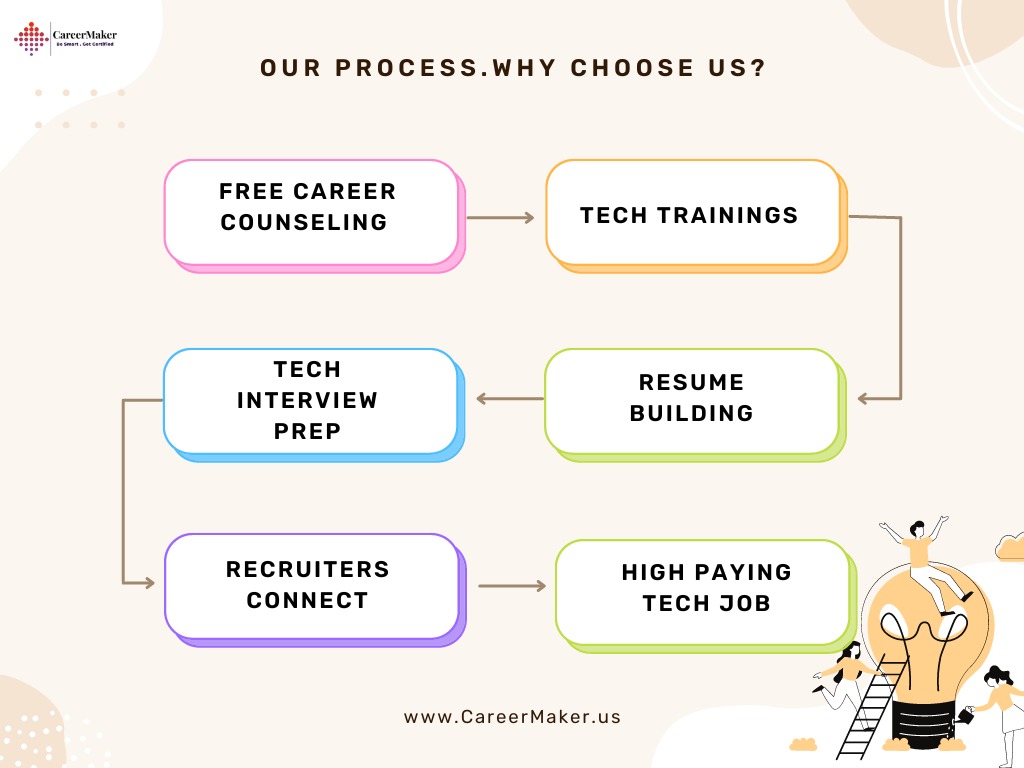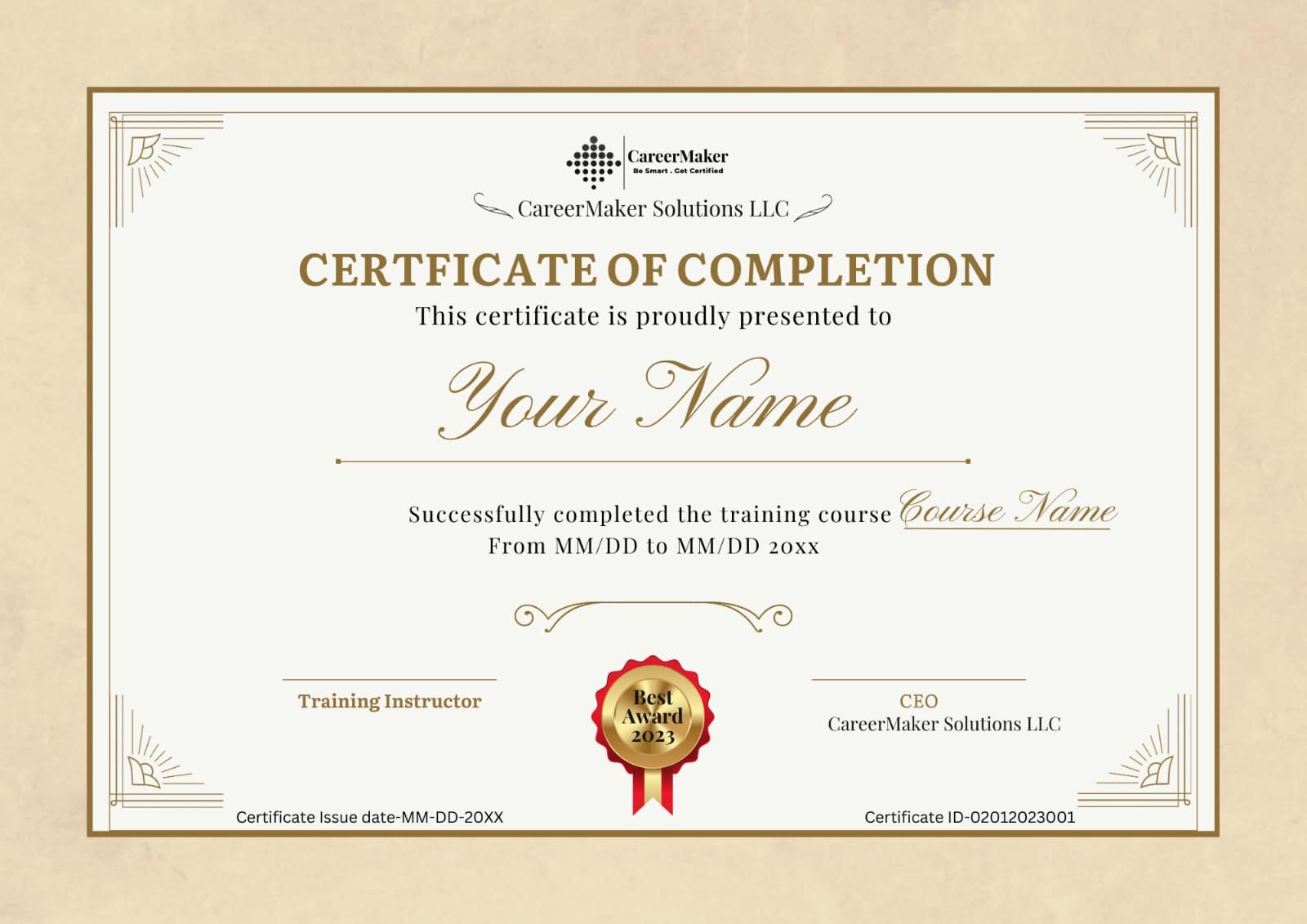Certified Information Systems Security Professional(CISSP) Certification Training
Are you ready to take your cybersecurity career to new heights? At CareerMaker, we offer comprehensive CISSP certification training designed to help you excel in the field of cybersecurity and enhance your professional opportunities. Our training program is specifically tailored to provide you with the knowledge and practical expertise required to succeed in the ever-evolving world of information security.
The CISSP methodology objectives from the one exam needed to obtain the CISSP Training Certification have been covered by CareerMaker experts in this intermediate (ISC)2 skills training.
A secure company environment employing internationally recognised security standards is designed, built, and maintained as part of the CISSP Certification Training . Additionally covering industry best practices, this programme will get you ready for the CISSP certification test.
Years in IT training industry
IT professional Trained
Countries
Bootcamps
- TRUSTED BY -










- CISSP Certification COURSE HIGHLIGHTS -

The following topics will be covered by participants in the Certified Information Systems Security Professional (CISSP) training:
- A thorough understanding of an organization's information security requirements
- Defining IT security architecture, design, and management
- The qualifications needed to obtain the CISSP certification
- Learn everything there is to know about each of the 8 domains listed in the ISC2 CISSP Common Body of Knowledge (CBK)
- Enhancing enterprise security operations
- Systems for access control and different approaches to IT security and governance for an enterprise
- Upcoming Live BOOTCAMP CALENDAR -
Schedule of Classes
| 09:00 AM-01:00 PM(CST) | Weekend Morning | 05 April 2025 - 03 May 2025 | Live Online | ENROLL NOW | INQUIRY NOW |
| 05:00 PM-09:00 PM(CST) | Weekend Evening | 05 April 2025 - 03 May 2025 | Live Online | ENROLL NOW | INQUIRY NOW |
| 07:00 PM to 09:00PM(CST) | Weekdays | 07 April 2025 - 03 May 2025 | Live Online | ENROLL NOW | INQUIRY NOW |
05 April 2025 - 03 May 2025
05 April 2025 - 03 May 2025
05 April 2025 - 03 May 2025
-CISSP Certification Course Description -
The Certified Information Systems Security Professional (CISSP) course is designed to provide participants with comprehensive knowledge and skills in the field of information security. This course covers the eight domains of the CISSP Common Body of Knowledge (CBK), equipping individuals with the expertise needed to design, implement, and manage robust security programs in today's complex digital landscape
This course is ideal for professionals involved in information security management, such as security consultants, managers, auditors, and network administrators. It is also suitable for individuals aspiring to enter the field of cybersecurity and seeking to enhance their knowledge and credentials
Applicants should possess a minimum of five years' cumulative paid work experience in two or more of the eight domains within the CISSP CBK. Obtaining a four-year college degree or its regional equivalent, or earning an additional credential from the (ISC)² approved list, will fulfill one year of the requisite experience. However, educational credit will only meet the criteria for one year of experience.
Individuals lacking the necessary experience for CISSP certification can opt to become an Associate of (ISC)² by successfully clearing the CISSP examination. As an Associate of (ISC)², they will then have a six-year period to amass the mandatory five years of experience
- Length of exam | 4 hours
- Number of items | 125 - 175
- Item format | Multiple choice and advanced innovative items
- Passing grade | 700 out of 1000 points
- Exam language availability | English
- Testing center | (ISC)2 authorized PPC and PVTC Select Pearson VUE Testing Centers
the standard US exam fee is $ 749
To pass the CISSP exam, you must obtain a minimum passing score of 700
CISSP Exam Objectives
Domains | Average Weight |
|---|---|
1. Security and Risk Management | 15% |
2. Asset Security | 10% |
3. Security Architecture and Engineering | 13% |
4. Communication and Network Security | 13% |
5. Identity and Access Management (IAM) | 13% |
6. Security Assessment and Testing | 12% |
7. Security Operations | 13% |
8. Software Development Security | 11% |
Total | 100% |
The CISSP certification remains active for a duration of three years. To ensure its continuation, individuals can opt for one of two methods: accumulating 40 Continuing Professional Education (CPE) credits annually for a total of three years, or retaking the exam. CPE credits are earned by successfully completing pertinent professional educational activities.
Request for more Information
-CISSP Certification Syllabus -
Risk and Security Management
- Recognize, uphold, and support professional ethics
- Understanding and utilising security principles
- Analyze and put security governance ideas into practice
- Analyze compliance and additional requirements.
- Recognize the legal and regulatory concerns that concern information security from a comprehensive perspective.
- Recognize the demands of various sorts of investigations (i.e., administrative, criminal, civil, regulatory, and industry standards)
Asset Protection
- Determine and categorise the assets and information
- Specify the conditions for handling information and assets.
- Secure resource provision
- Control the data lifecycle
- Make that the right assets are kept (such as End-of-Life (EOL) and End-of-Support (EOS) assets).
- Establish data security measures and required compliance.
Security Engineering and Architecture
- Using secure design concepts, conduct research, put them into practice, and oversee engineering processes
- Recognize the underlying ideas behind security models (e.g., Biba, Star Model, Bell-LaPadula)
- Choosing controls based on the needs for system security
- Recognize the information systems (IS) security features, such as memory protection, Trusted Platform Modules (TPM), and encryption and decryption.
- Determine and address the security architecture, design, and solution aspects’ vulnerabilities.
Network and Communication Security
- Network architectures should be examined and implemented with secure design principles.
- Components for a secure network
- Implement secure communication methods as specified
Identification and Access Control (IAM)
- Manage the identity and authentication of people, devices, and services Manage physical and logical access to assets
- Federated identity using a service from a third party
- Manage and implement authorisation procedures
- Control the lifecycle of identity and access provisioning.
Security Testing and Assessment
- Create and verify assessment, testing, and auditing procedures
- Test the security controls
- Gather information about security procedures (e.g., technical and administrative)
- Analyse test results, then provide a report.
- Perform or assist with security audits
Security Procedures
- Recognize and abide by investigations
- Perform logging and monitoring tasks.
- Configuration Management (CM) should be used (e.g., provisioning, baselining, automation)
- Implement fundamental security operations principles.
- Protect resources by using
- Take incident management actions
- Operate and maintain investigative and defence mechanisms
- Support patch and vulnerability management implementation
- CISSP Certification Jobs & Salary -

The CISSP certification is a globally recognized credential in the field of information security. It can significantly enhance your job prospects by validating your expertise and making you a more competitive candidate for various information security roles.
CISSP-certified professionals can pursue roles such as Information Security Analyst, Security Consultant, Security Manager, Network Security Engineer, Security Architect, and many more.
Yes, CISSP certification often leads to higher earning potential. Professionals with CISSP credentials are generally well-compensated due to their specialized skills and knowledge in information security.
The average salary for CISSP-certified professionals is $118,684 varies based on factors such as experience, location, job role, and industry. However, CISSP holders tend to earn competitive salaries above the industry average.
CISSP certification is highly valued across various industries, including finance, healthcare, technology, government, and more. Information security is crucial in virtually every sector, making CISSP skills in demand.
While work experience is not always a strict requirement, having relevant experience in information security can significantly enhance your job opportunities and earning potential with a CISSP certification.
The demand for CISSP-certified professionals remains consistently high due to the growing importance of cybersecurity in today's digital landscape. Organizations are actively seeking skilled individuals to protect their sensitive data.
Absolutely. CISSP certification can open doors to advanced positions, leadership roles, and management positions within the field of information security. It demonstrates your ability to handle complex security challenges.
Many employers offer benefits such as higher salaries, bonuses, career advancement opportunities, professional development support, and recognition for CISSP-certified employees.
To maximize your earning potential, consider gaining specialized skills within the CISSP domains, seeking leadership roles, staying updated with industry trends, and continuously improving your knowledge and expertise in information security
- Benefits Of Choosing CareerMaker Solutions ? -

- Our World-Class CERTIFIED INSTRUCTIOR -
- Certification of Course Completion -

- Success Stories -
Start Your Cybersecurity Journey Today -
Don’t miss out on the opportunity to advance your cybersecurity career with our comprehensive CISSP certification training. Join us today and gain the knowledge and skills needed to excel in the complex world of cybersecurity.
Call Us Today to learn more about our training program, course schedules, and enrollment options. Start your journey towards a successful cybersecurity career today!

- FAQ -
CISSP (Certified Information Systems Security Professional) certification is a globally recognized credential that validates expertise in information security. It's crucial for demonstrating skills in designing, implementing, and managing security programs, enhancing career prospects.
CISSP certification can open doors to a wide range of job roles in information security and cybersecurity, often leading to higher earning potential due to the specialized skills it represents.
CISSP-certified professionals can pursue roles like Information Security Analyst, Security Consultant, Security Manager, Network Security Engineer, and more.
Yes, CISSP-certified professionals typically earn higher salaries compared to their non-certified counterparts due to their specialized knowledge and expertise.
The average salary for CISSP-certified professionals varies based on factors like experience, location, and industry. However, it generally falls within a competitive range in the cybersecurity field.
Yes, as CISSP-certified professionals gain more experience and expertise, their earning potential tends to increase, reflecting the value of their skills.
CISSP-certified professionals are in demand across various industries, including finance, healthcare, government, and technology, where information security is critical.
Yes, metropolitan areas and technology hubs often have a higher demand for CISSP-certified professionals, but the need for cybersecurity expertise is widespread.
Yes, CISSP candidates need to have at least five years of cumulative paid work experience in two or more of the eight CISSP domains. An approved credential or a four-year degree can substitute for one year of experience.
Yes, candidates with limited experience can become Associate of (ISC)² by passing the CISSP exam and then gain experience over six years to earn full CISSP certification.
CISSP-certified professionals are responsible for designing, implementing, and managing security programs, ensuring the confidentiality, integrity, and availability of information assets.
There are various training options, including online courses, study guides, practice exams, and instructor-led classes. (ISC)² offers official resources for effective exam preparation.
While there are no strict educational prerequisites, a basic understanding of networking, security concepts, and IT fundamentals is beneficial for CISSP exam candidates.
The CISSP exam consists of approximately 100-150 multiple-choice and advanced innovative questions. It is a computer-based exam lasting three hours, requiring a scaled score of 700 out of 1000 to pass.
CISSP certification must be renewed every three years by earning a minimum of 120 Continuing Professional Education (CPE) credits and adhering to the (ISC)² Code of Ethics.
All eight domains within the CISSP Common Body of Knowledge (CBK) are important, but roles that involve Security and Risk Management, Communication and Network Security, and Identity and Access Management (IAM) are often sought after.
CISSP-certified professionals can enjoy benefits such as career advancement opportunities, recognition, access to a global network of experts, and the satisfaction of contributing to cybersecurity.
Many CISSP-certified professionals have the flexibility to work remotely, especially in roles that involve cybersecurity analysis, management, and consulting.
Many CISSP-certified professionals have the flexibility to work remotely, especially in roles that involve cybersecurity analysis, management, and consulting.
CISSP-certified professionals are poised for growth in their careers as organizations increasingly prioritize cybersecurity, leading to leadership roles, specialization, and innovative security solutions.
Industries such as healthcare, finance, e-commerce, and critical infrastructure are expected to have a growing demand for CISSP-certified professionals to protect sensitive data and digital assets.
Yes, CISSP certification provides a solid foundation for progressing to higher-level roles like Chief Information Security Officer (CISO) and other leadership positions within cybersecurity.
CISSP-certified professionals can join (ISC)²'s professional community, participate in local chapters, attend industry conferences, and engage with online forums to connect with peers and stay current in the field.

